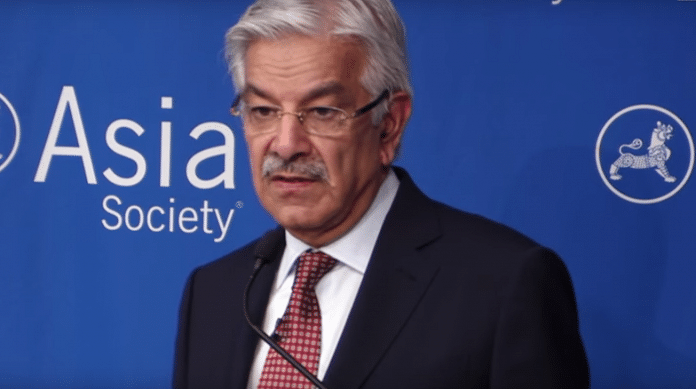Statements made by Pakistan foreign minister Khwaja Asif do not portend a paradigm shift in Pakistan. Far from it.
Khawaja Asif, Pakistan’s foreign minister, has a penchant for provocative talk. Last year, when he was defense minister, he threatened on a Pakistani television show to attack India with nuclear weapons if his country’s “defense and survival” were endangered.
Today, he is once again generating headlines. Speaking at an Asia Society event in New York on 27 September, he said that several decades ago the U.S. government treated the Haqqani network and Lashkar-e-Taiba (LeT) as its “darlings” and “wined and dined” them at the White House. His remark sparked an extraordinary response from LeT leader Hafiz Saeed, who has announced his intention to sue Asif for defamation.
To be fair, it’s true that it’s mainly the Haqqanis that were associated with the Reagan administration during the anti-Soviet battles in Afghanistan in the 1980s. Still, there’s something ironic about a UN-designated terrorist suing for defamation. At any rate, Asif’s apparent implication—you supported these guys in the past, so ease up on the pressure—won’t fly in Washington. This is not a case of past being prologue. For the U.S. government, the rationale is simple: The Haqqanis may have once helped serve our interests, but today they target our troops in Afghanistan. In effect, it’s time to kill the darlings of the past.
But all this talk of darlings and wining-and-dining and Saeed’s litigation threat has overshadowed the most intriguing comments made by Asif at last week’s Asia Society event. The foreign minister stated that LeT and the Haqqani network are “liabilities,” and asked the United States to “give us time to get rid of these liabilities.”
This is an extraordinary admission, given that Pakistan has long viewed LeT as an asset to be used against India—one of the few coercive tools, along with nuclear weapons, that can be wielded to neutralize the superiority of India’s conventional military capacities. The Haqqani network, meanwhile, is viewed by Pakistan as a means of pushing back against India’s presence in Afghanistan. Does Asif’s admission portend a monumental course correction for a policy that Pakistan publicly denies but has long embraced?
Don’t hold your breath.
Asif deserves praise for acknowledging something that many in Washington and Delhi, and likely some in Islamabad too, have long believed: Whenever you treat a terror group with kid gloves, you play with fire.
Still, Asif’s comments do not portend a paradigm shift. Far from it. Let’s not forget that in Pakistan, it’s the military, not the government, that makes the decisions about policies toward militancy. And there’s little evidence that the armed forces have heartily endorsed Asif’s admission. To be sure, Saeed is under house arrest—but, if patterns of the past are any indication, he could be released in due course.
Additionally, recent media reports have revealed that the Pakistani security establishment is trying to incorporate into politics those militants willing to forswear violence. It remains unclear, however, what the true intentions of this “mainstreaming” process really are—a genuine effort to defang militancy, or an attempt to legitimize the activities and ideologies of militants by integrating them into the political process.
So why did Asif say that LeT and the Haqqani network are liabilities? To his credit, he may have said this because he believes it to be true. If so, then such a statement risks inflaming already-considerable civil-military tensions in Pakistan. The military may not take well to a top civilian official dissenting on a policy that the armed forces have long embraced.
There’s also the possibility that Asif wanted to appeal to a very specific audience—the U.S. government. At a time when American pressure is building on Pakistan to crack down more robustly on terrorism on its soil, there’s something to be said for a top Pakistani diplomat acknowledging the limited utility of terrorists—a gesture that Islamabad and Rawalpindi may hope will compel Washington to ease up on the pressure, at least temporarily.
In this vein, Asif was wise to refer to both the Haqqanis and to LeT as liabilities. The Haqqani network is the Pakistan-based terror group that worries Washington the most, because of the clear and present danger it poses to U.S. forces in Afghanistan.
However, Washington is focused laser-like on LeT as well. Six Americans died in the Mumbai terror attacks of 2008—a massacre that Washington is convinced was carried out by LeT. The $10 million bounty that America has put on Saeed’s head and its repeated pledges to work with New Delhi to address the LeT threat accentuate the degree of Washington’s concern.
Alas, this isn’t to say that Washington will be won over or reassured. The Trump administration will want to see real action, as opposed to mere talk. And there’s already been plenty of the latter, but precious little of the former, in recent years.




Please correct the sentence “The Haqqani network is the Pakistan-based terror group” This group exist in Afghanistan not in Pakistn which fled during zarab-i-Azab operation….